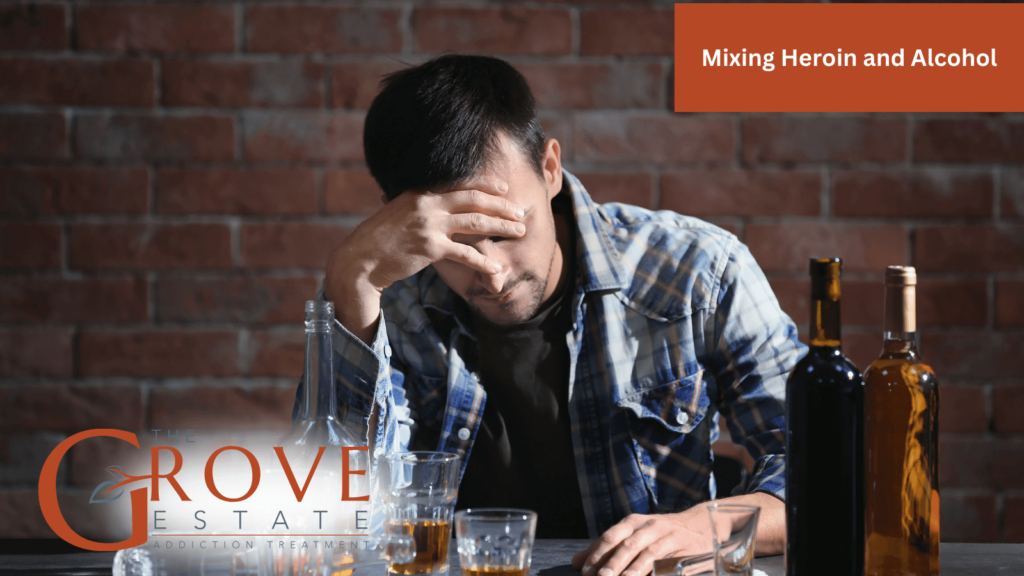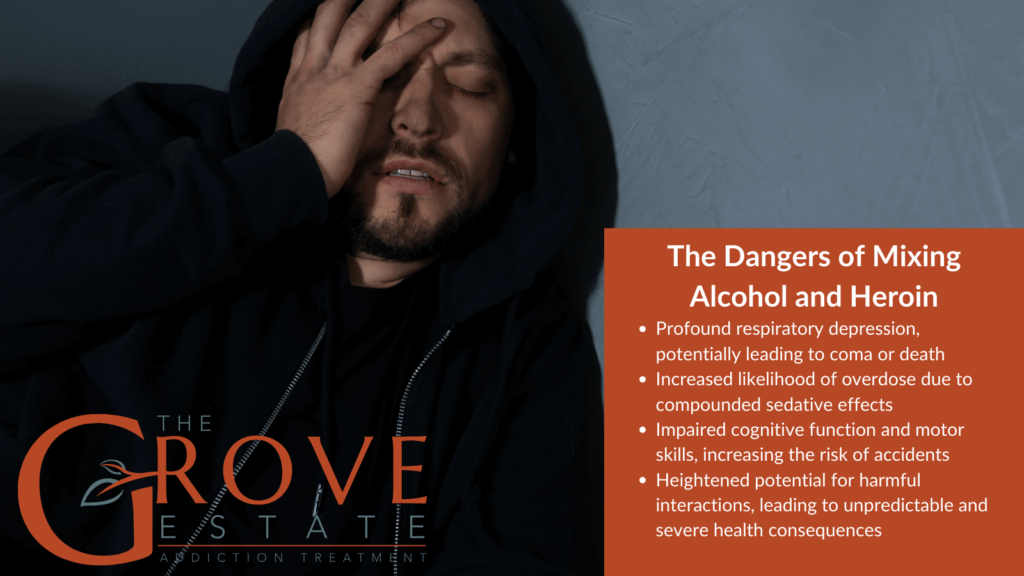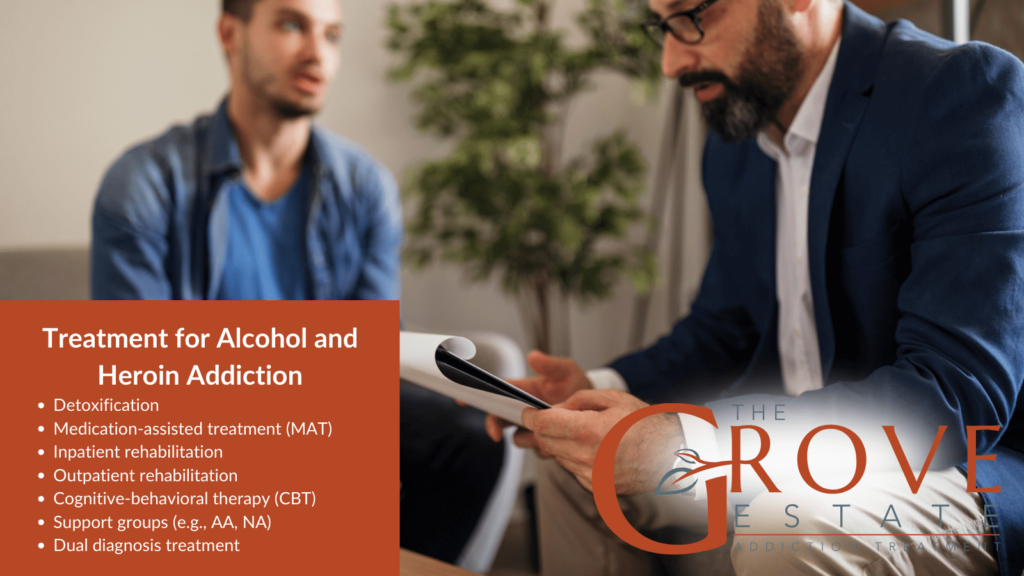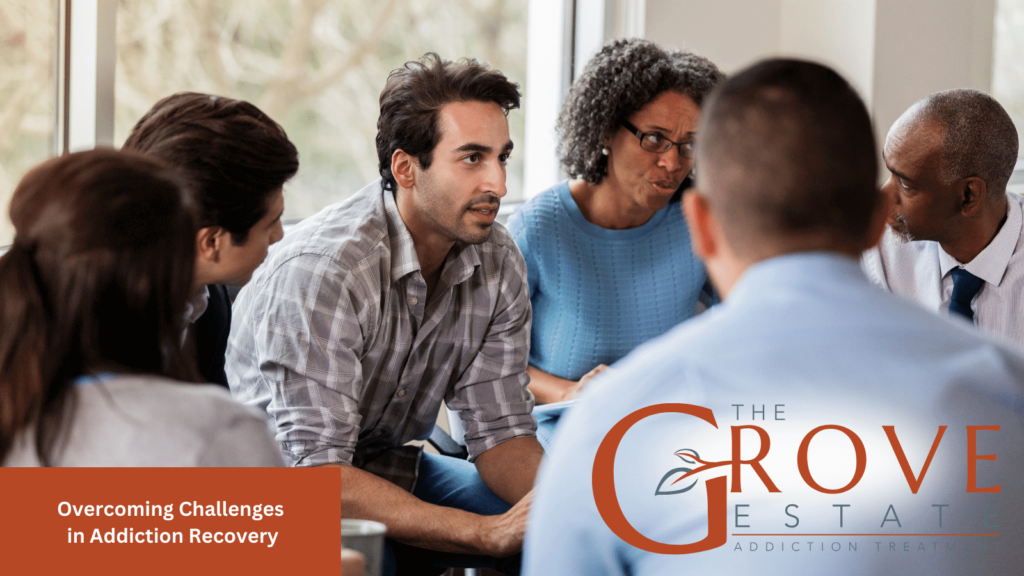The hazardous interaction between alcohol and heroin, two substances notorious for their severe impacts on human health, takes the risk to an even more alarming level. According to the National Institute on Drug Abuse, individuals who are addicted to heroin are 2 to 3 times more likely to suffer from alcohol use disorder. This co-occurrence of heroin and alcohol abuse signals a wider public health crisis.
When mixed, these substances can dramatically depress the central nervous system, leading to a decrease in heart rate, respiratory failure, and potentially fatal outcomes. The lasting effects, both physical and mental, of this lethal mix are complex and necessitate thorough comprehension and intervention.

The Hazards of Mixing Alcohol and Heroin
Mixing alcohol and heroin heightens risks due to their combined depressant effects on the central nervous system, leading to dangerous respiratory depression, potential organ damage, increased risk of overdose, and compounded addiction and mental health challenges. According to the Centers for Disease Control and Prevention, binge drinkers are four times more likely to use substances like heroin, underlining the significant risk associated with alcohol consumption and its potential as a gateway to using other dangerous drugs.
The combination of Heroin and Alcohol use accelerates addiction processes, making recovery more challenging, and is linked with higher incidences of psychiatric disorders like depression and anxiety. Addressing this combination is crucial due to its severe health implications, risk of fatal overdose, and the complex interplay between substance abuse and mental health.
What is Heroin?
Heroin, derived from morphine, a substance from opium poppy plants, is notorious for its high addiction potential. It’s primarily used for the intense euphoria it induces. Heroin can appear as a white or brown powder, or as “black tar heroin,” a black, sticky form. Methods of consumption vary widely, including injection, snorting, sniffing, and smoking. These methods allow for quick entry into the brain, heightening the risk of addiction and severe health complications.
What are the Effects of Heroin on the Body?
Heroin impacts the body both immediately and over the long term, causing physical and psychological effects. Immediately, it creates a rush of euphoria, reduces pain, and impairs cognitive functions.
Long-term use can lead to serious health issues like liver and kidney disease, respiratory problems, and infectious diseases from needle sharing. Psychologically, heroin use can cause depression, anxiety, and worsening of pre-existing mental health conditions. The dependency it creates makes recovery a challenging process, often requiring comprehensive treatment and support.

What Happens When You Mix Alcohol and Heroin?
Mixing heroin with alcohol increases the sedative effects of both, intensifying risks significantly. This combination can lead to profound respiratory depression, where breathing becomes dangerously slow or stops, greatly elevating the chance of overdose and death. The interaction between these substances can also obscure signs of an overdose, making it difficult to seek timely help. The synergy of alcohol and heroin’s depressant properties places users at a severe risk of immediate harm and long-term health complications.
When heroin is mixed with alcohol, the risks include:
- Profound respiratory depression, potentially leading to coma or death
- Increased likelihood of overdose due to compounded sedative effects
- Impaired cognitive function and motor skills, increasing the risk of accidents
- Heightened potential for harmful interactions, leading to unpredictable and severe health consequences
How Does Combining Alcohol and Heroin Affect The Risk of Overdose?
The risk of overdose from mixing heroin and alcohol is significantly high due to their combined depressant effects. Symptoms of overdose can include:
- Extreme drowsiness
- Confusion
- Difficulty breathing or shallow breaths
- Weak pulse
- Blue-tinted lips or fingernails
- Vomiting
- Unconsciousness
- Inability to awaken
You should call a doctor or seek emergency medical assistance immediately if you or someone else exhibits any signs of an overdose, such as difficulty breathing, extreme drowsiness, unconsciousness, or any other severe symptoms listed. Prompt medical attention is critical in these situations to prevent life-threatening complications.
What are Common Misconceptions About Mixing Alcohol and Heroin?
- Myth: Heroin is a safe alternative for managing alcohol withdrawal.
- Truth: Using heroin to manage alcohol withdrawal is extremely dangerous and increases the risk of developing dual addiction, without effectively addressing withdrawal symptoms.
- Myth: Heroin can alleviate the symptoms of alcohol withdrawal more effectively than medical treatment.
- Truth: Medical treatments are specifically designed to manage withdrawal symptoms safely, whereas heroin use complicates and worsens overall health.
- Myth: There are no risks in substituting one addiction for another.
- Truth: Substituting alcohol addiction with heroin addiction introduces new health risks, does not solve the underlying issue of addiction, and can lead to fatal overdoses.
Safer alternatives for dealing with withdrawal symptoms include medically supervised detox programs, medication-assisted treatment (MAT), and support from addiction recovery professionals.

How Do I Seek Treatment for Alcohol and Heroin Addiction?
Seeking treatment for alcohol and heroin addiction often involves a combination of treatment methods. Here is a list of effective approaches that aim to address both the physical and psychological aspects of addiction.
- Detoxification
- Medication-assisted treatment (MAT)
- Inpatient rehabilitation
- Outpatient rehabilitation
- Cognitive-behavioral therapy (CBT)
- Support groups (e.g., AA, NA)
- Dual diagnosis treatment
Engaging with professional help is crucial because addiction specialists can provide a personalized treatment plan that enhances the likelihood of recovery, supports mental health, and reduces the risk of relapse. Professional intervention offers the tools and resources necessary for individuals to rebuild their lives and maintain long-term sobriety.

How Do I Overcome Challenges in Addiction Recovery?
Overcoming challenges in addiction recovery involves embracing a comprehensive approach that includes setting realistic goals, developing coping strategies for triggers and cravings, and engaging in therapy or counseling. Support systems play a crucial role, encompassing family, friends, and recovery groups that offer encouragement and understanding. Accessing resources such as professional help, support groups like AA or NA, and educational materials can provide additional guidance and support. Persistence, a positive mindset, and a willingness to seek help are key to navigating the path to recovery.
How does the body process the combination of alcohol and heroin differently than when taken separately?
The liver metabolizes alcohol first, which can delay the breakdown of heroin, increasing its presence in the body. This prolongs and intensifies heroin’s effects, raising overdose risks.
Can mixing alcohol and heroin change the effectiveness of naloxone in an overdose situation?
While naloxone effectively reverses opioid overdose, the presence of alcohol complicates the medical response, potentially requiring additional interventions to address alcohol-related effects.
What are the long-term mental health effects of regularly mixing alcohol and heroin?
Chronic use of both substances can exacerbate or trigger new mental health issues, including depression, anxiety, and increased susceptibility to addiction-related mental health disorders.
How do withdrawal symptoms differ when discontinuing both alcohol and heroin versus one at a time?
Quitting both substances simultaneously can result in more severe withdrawal symptoms, as the body has to manage the effects of withdrawing from two substances with different effects on the brain and body.
What are the immediate risks of combining alcohol and heroin?
The immediate risks of combining alcohol and heroin are profound and can be life-threatening. The sedative effects of both substances significantly increase the risk of respiratory depression, which can lead to coma or death. Additionally, this combination can cause severe impairment in cognitive functions and motor skills, heightening the risk of accidents and injuries. The compounded effects make it difficult to recognize the signs of an overdose, delaying emergency response and increasing the fatality risk.
Understanding the dynamics of alcohol and Codeine interaction can offer insights into how alcohol interacts with opioids like heroin. Both substances similarly depress the central nervous system, but heroin’s effects are more potent and dangerous, especially when mixed with alcohol.
What makes heroin and alcohol a particularly dangerous combination?
Heroin and alcohol are a particularly dangerous combination because they both depress the central nervous system. This can lead to significantly slowed breathing and heart rate, putting the user at a high risk of overdose and death. The liver’s dual burden of metabolizing both substances also increases the risk of acute liver damage or failure.
Participating in group counseling can be an effective way to understand the risks of mixing substances like alcohol and heroin. Sharing experiences and learning from others who have faced similar challenges can provide valuable perspectives and motivation for overcoming substance abuse.

Share This Post



